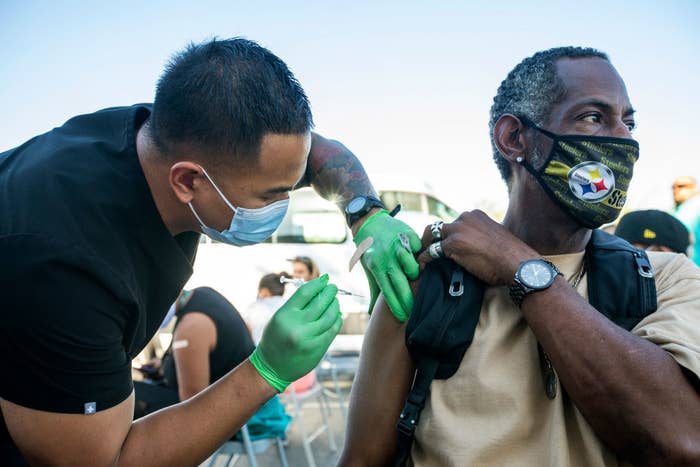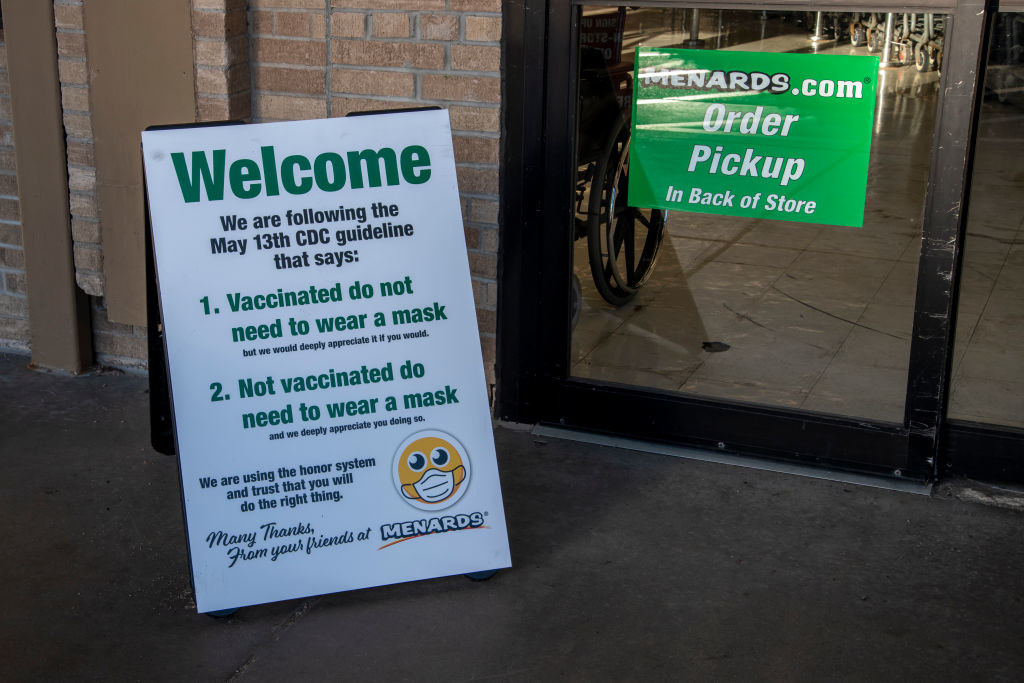
Facing the threat of a more infectious Delta variant, vaccine-makers Pfizer and BioNTech released a statement Thursday saying it “may be beneficial” for people to get a third dose of their COVID-19 vaccine within six months to a year. But US health officials and other scientists have vehemently disagreed, saying our current vaccines are holding up really well — at least so far.
“Americans who have been fully vaccinated do not need a booster shot at this time,” reads an unusual joint statement from the FDA and the CDC that was released hours after Pfizer’s announcement. “People who are fully vaccinated are protected from severe disease and death, including from the variants currently circulating in the country such as Delta.”
Holding off on a booster is reasonable, scientists told BuzzFeed News, both because our vaccines are still holding off infections against current variants and because even in the rare cases when vaccinated people do get infected, they’re protected against severe disease and death.
“The dam is still holding, even if there has been some splashing going on,” said immunologist E. John Wherry, director of the Penn Institute of Immunology.
The strength of the vaccines, paired with the fact that Delta has rapidly become the dominant strain of the virus circulating in the US, only increases the urgency that more people get fully vaccinated, health officials said. In some parts of the US, more than 80% of new COVID-19 cases are Delta, and it is linked to surges in the UK and Africa, with a surge feared for Europe by August.
"Preliminary data from several states over the last few months suggest that 99.5% of deaths from COVID-19 in the United States were in unvaccinated people," said CDC chief Rochelle Walensky on Thursday. "Those deaths were preventable with a simple, safe shot."
Clinical trials of the messenger RNA (mRNA) vaccines last year reported a stunningly good, roughly 95% rate of preventing infections by the original coronavirus strain. While recent studies of the effectiveness of Pfizer’s two-shot mRNA vaccine against the Delta variant in the United Kingdom and Canada have shown a slight dip in the protection the shots offer, two doses still reduce the risk of infections by 79% to 88%. Israel’s health authority announced unpublished results in May suggesting protection against Delta was lowered to 64%, but even then, the shots were 93% effective at preventing severe disease and death.
Even the one-shot Johnson & Johnson vaccine, authorized in the US but used more rarely, offers reasonably good protection against Delta, said Anthony Fauci, chief of the National Institute of Allergy and Infectious Diseases, during a Thursday White House briefing. He added that the vaccine still lowers the risk of hospitalization by 93%.
“If you had told any of us that’s the effectiveness we have now with vaccines a year ago, we would have run to have taken that deal,” said Wherry. “We’re talking about a very substantial effectiveness rate that could have a major impact on restraining the pandemic.”
Fauci and other experts stressed the emergence of more-contagious variants as just one more reason for the 32% of American adults still unvaccinated to get their shots. “Please get vaccinated. It will protect you against the surging of the Delta variant,” said Fauci.

Variant Time Bomb
Still, as long as the virus is replicating in people, it will mutate and give rise to new strains, said immunologist Andrew Pekosz of the Johns Hopkins Bloomberg School of Public Health.
Some of those strains have mutations that make them more infectious. The Delta strain, for example, is roughly 2.5 times more likely to infect unvaccinated people under age 50. And those mutations can also make the viruses less recognizable to our immune systems, which have been trained by vaccines to target the original coronavirus.
The newest variant raising concern is Lambda, flagged by the World Health Organization as a “variant of interest” in June. While a preliminary study in Chile suggests that, like some other variants, it lowers the effectiveness of vaccines, more studies are needed.
“The problem is the variants that we don’t know of, and where would those be generated,” said Jerome Kim, director of the International Vaccine Institute, a nonprofit focused on global vaccine development based in South Korea. “The risk is that if we continue to allow significant portions of the globe to be unvaccinated, then we are putting ourselves and all of our investments and time at risk, really undermining a year’s worth of really intense scientific effort.”
That presents yet another argument against delivering booster shots to people so soon, since those shots could be used to deliver vaccines to those who are still unvaccinated. Even ignoring humanitarian concerns, getting vaccines out to the rest of the world is the best way to stop the emergence of variants that could threaten everyone.
While mutations can help the virus, there are only so many changes it can make without compromising what makes the coronavirus so effective in the first place: the spike proteins it relies on to infect cells. “The amount of evolutionary search space that the virus can explore is constrained by the fact that the virus spike actually has a lot of jobs to do,” said Wherry. “You can only change so many parts without actually destroying the virus itself. So we are not going to see an infinite number of variants.”
That partly explains why our vaccines still work as well as they do against current variants: Vaccinated immune systems churn out defenses keyed to the parts of the spike protein that haven’t yet mutated. “One or two days into an infection, the immune system that is ready starts hitting the virus hard," said Pekosz.
The Virus's Achilles' Heel
That same biological timing might explain why, even when vaccinated people do get COVID-19, they are less likely to get severely ill, be hospitalized, or die.
As viral diseases go, COVID-19 is “a slow burn,” said Deepta Bhattacharya, an immunologist at the University of Arizona. In its early days, when it is most contagious, people experience cold symptoms or no symptoms at all. In serious cases, after about a week, people can go on to develop dangerous lung infections when their immune systems go haywire and attack vital organs.
This two-stage illness made containing the disease without vaccines almost impossible, since those early asymptomatic days allow people to transmit the virus “when they don't even know they're sick,” said Bhattacharya.
“So that's bad. But from an immunological standpoint, now with the vaccines, that's actually good, because it buys the immune system some time to clear the virus out before it starts causing major problems,” Bhattacharya added, calling this two-stage attack the coronavirus’s “Achilles' heel.”
In addition to antibodies, the immune system makes so-called memory cells that might also explain how well our vaccines offer protection against severe disease, said Brian Lichty, an immunologist at McMaster University, in an email. While even fully vaccinated people might have a reduced ability to block infection from variants, since the antibodies are no longer a perfect match for the virus, their memory immune cells can still blunt the infection while they develop new immunity to the variant.
Lichty tested an experimental vaccine aimed only at producing memory cells that targeted nonspike parts of the original coronavirus, finding that it still helped protect mice against variants. “This isn’t terribly surprising,” Lichty said by email. “There is still some replication of SARS-CoV2 in these mice, however; it is not blocked, just reduced.”
New studies have shown that memory cells can offer protection for at least eight months, providing even more reassurance as more infectious strains emerge. “Almost no matter what, I don't think you're going to fall back and end up again where you were when you had not been vaccinated at all,” said Bhattacharya.
Short of severe illness, vaccination also likely moderates the crummy symptoms of an infection that don’t qualify as severe but are still no fun.
“There’s a lot of difference between having a headache for a few hours and being knocked flat for two days or losing your sense of smell for life,” said Bhattacharya.

When to Boost
In light of the current effectiveness of vaccines against variants, the caution expressed by the CDC and the FDA about a booster right now makes sense, experts told BuzzFeed News. But that still leaves open the question of when a booster might be needed.
First, there’s an urgent need for more genome sequencing in Africa, Latin America, South America, and parts of Asia where outbreaks are occurring, as well as in less-vaccinated parts of the US, to prevent being caught by surprise by a particularly dangerous new strain.
“How many times do we have to learn the lesson that this is a disease that we can predict?” asked Kim. “Unvaccinated people are at risk. You may not have an outbreak now, but you will have an outbreak, and when it comes, you will be taken unawares, hospital beds will fill up, intensive care units will fill up, and people will die.”
The end goal is to get enough people vaccinated worldwide so that the virus cannot spread easily and will have fewer chances to mutate. If COVID-19 can become a nondeadly disease like a cold, the decision about a booster becomes more of a question about how long immunity provided by the vaccines will last. (Though, it’s worth noting, people on chemotherapy or with HIV might need boosters sooner to increase their immunity to the virus.)
One of the benefits of the mRNA vaccines that the US has authorized is that they can be fine-tuned against a particular variant much more quickly — on the scale of weeks instead of months, like older vaccines. Flu vaccines grown in eggs, for example, typically have their design selected in February against a flu season that doesn’t start until October, giving that virus time to mutate and evade the shots. The flexibility of mRNA vaccines gives us the luxury of responding quickly with a shot if a truly dangerous new coronavirus variant emerges, before it has that kind of time to mutate further.
“There’s also a difference between when you want to boost and when you need to boost,” said Bhattacharya. "It’s not very likely for variants to completely evade vaccines in our lifetimes, but it could get to the point where they evade enough of it that it’s a nuisance and you want to booster. But again, that's a very different situation than what we're at right now.”
